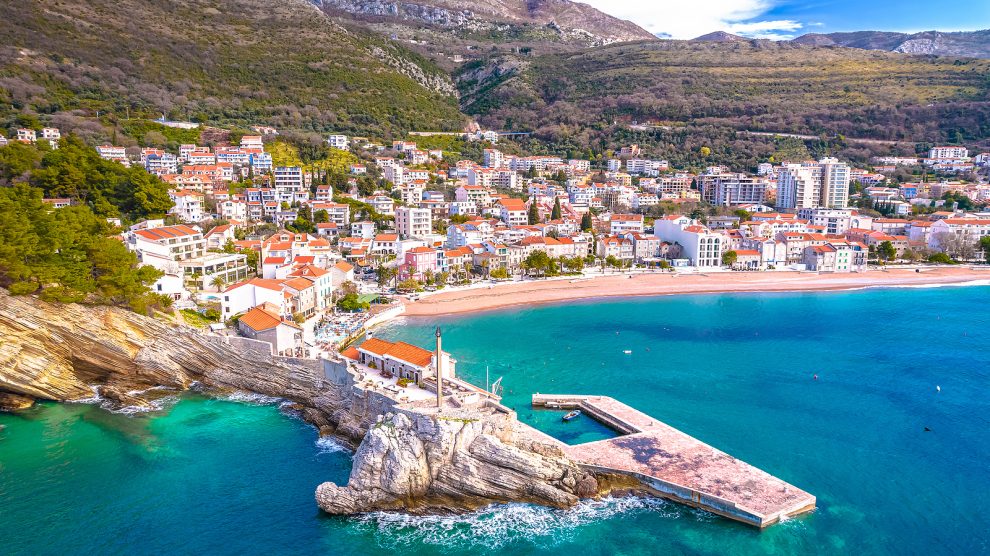Montenegro’s economy is overly reliant on tourism and foreign-born workers.
Home to just over 600,000 people, stunning mountains, and perhaps the most beautiful stretch of Adriatic coastline, Montenegro’s days of obscurity are over. Now connected to the rest of Europe by budget airlines via its capital of Podgorica, tourism in Montenegro is expected to fully rebound to pre-pandemic levels this year.
- EU hints at Single Market access for Western Balkans, in return for reforms
- Russia’s ‘opaque’ Balkan network
- The fall of Yugoslavia: Five essential reads
The strength of its tourism industry—boosted by the arrival of Ukrainian and Russian citizens feeling war and conscription—and 516 million euros of foreign direct investment (FDI) just between January and July of this year significantly contributed to the country’s resilience in the face of high inflation.
Inflation reached 17.5 per cent in November 2022 then declined for eight months and will average 9.1 per cent for 2023 as strong tourism, all-time low levels of unemployment, and a minimum wage hike continue inflationary pressure.
Social reform drives consumption… and inflation
That minimum wage hike was part of a broader social reform in 2022 that also shifted the tax burden away from low-income individuals and stimulated household consumption, combining with high tourism and FDI to push growth to 6.5 per cent in the first half of 2023.
The social reform’s abolition of mandatory health contributions and introduction of a non-taxable part of wages will further decrease unemployment, which the Vienna Institute for International Economic Studies (wiiw) forecasts will reach a new low of 13.8 per cent this year.
“The country faces issues due to a relative high rate of youth unemployment, contributing to a ‘brain drain’,” Bernd Christoph Ströhm, country expert at wiiw and the author of its October forecast for Montenegro, tells Emerging Europe.
“Montenegro also has a very pronounced labour shortage in the hotel, catering and construction industries. This is why some 20,000 foreigners—about ten per cent of the total number of employees in Montenegro—must be employed every year during the vital tourist season.”
In 2022, the service sector employed three-quarters of the country’s labour force.
Employing only 2.6 per cent of the workforce, Montenegro’s information technology sector is more modest. In the latest edition of the Emerging Europe IT Competitiveness Index, Montenegro ranked twentieth out of the 23 countries in the emerging Europe region in the overall index, second to last in IT infrastructure, and last in the region in ICT talent.
However, it ranked second to only Estonia for the sector’s economic impact thanks to its cost-competitiveness.
Montenegro is already a leader in hydropower and wind power—it had the largest share of wind power in domestic electricity production anywhere in Europe in December—but there is still room for growth. The government approved the construction of solar power plants in Cetinje and Nikšić in March, and the country’s grid operators will invest 200 million euros over the next few years to ready the power grid for this additional energy.
A new liquefied natural gas (LNG) terminal being built in the port city of Bar and underwater power cable from the same city to Italy are poised to make Montenegro a gas and electricity transit hub for Italy and the whole Balkan peninsula.
Political stability at last?
Ströhm expects a new Europe Now government to focus investments on developing renewables and generally continue the economic policies of their predecessors.
“The Europe Now movement will continue to draft and introduce policies aimed at reducing the gap between minimum wages and basic foodstuff prices,” says Ströhm. “Especially regarding policies aimed at limiting inflation, the new government will not diverge from utilising price caps on basic products. The Europe Now movement head, Milojko Spajić, already assessed the outgoing government’s current ‘Stop Inflation’ campaign as a successful policy in April 2023.”
“It currently remains unclear, though, how the Europe Now movement’s promises to increase minimum wages or to reduce daily working hours—to seven hours—will be financed, particularly in light of Montenegro’s current public debt situation,” he adds.
As the name implies, Europe Now’s priority is finalising Montenegro’s accession to the European Union, which has been scheduled for 2025. As Europe Now seeks to act on its campaign promises, it will have to also prioritise the European Commission’s concerns about Montenegro’s rising public debt, high fiscal deficits and maintenance of macroeconomic stability.
Nonetheless, Europe Now’s ascension to power—Spajić is likely to be confirmed as prime minister this week—is historic and presents an opportunity for political stability after years of chaos.
Prior to Europe Now’s electoral victory in June, Milo Đukanović had led Montenegro as either its prime minister or president almost continuously for three decades, through its independence from Serbia in 2006 and accession to NATO in 2017.
He led the Democratic party of Socialists of Montenegro (DPS)—the successor party to Yugoslavia’s Communist party—which governed Montenegro alone or in a coalition from 1991 until 2020, when it was defeated in parliamentary elections.
Internal disagreements between pro-Serb and pro-Western factions of the new government led to its ouster in a no-confidence vote in February 2022, then another, more strongly pro-Western government was formed that April only to collapse four months later.
Europe Now’s coalition will have a 44-seat majority in an 81-seat parliament, hopefully guaranteeing an end to years of political instability and institutional gridlock and thus attracting capital investments.
Unlike many news and information platforms, Emerging Europe is free to read, and always will be. There is no paywall here. We are independent, not affiliated with nor representing any political party or business organisation. We want the very best for emerging Europe, nothing more, nothing less. Your support will help us continue to spread the word about this amazing region.
You can contribute here. Thank you.







Add Comment